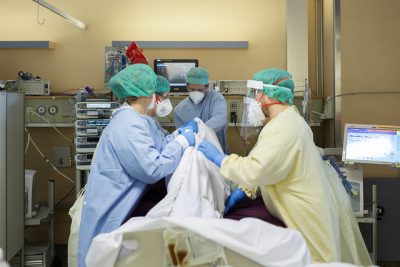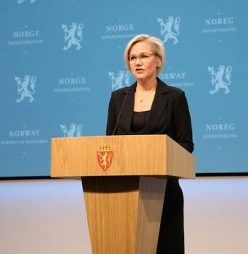One of the most poignant moments of the Corona crisis in Norway wound up being aired live on national TV last week. An intensive care nurse working at one of the country’s overburdened hospitals suddenly broke into tears while being interviewed, exhausted and exasperated after 21 months on the front line.

“We just don’t see any end to this,” Mona Bjerkland at Akershus University Hospital just outside Oslo told Norwegian Broadcasting (NRK), as she struggled to regain composure in a hospital corridor. “There were warnings about this, but it’s like nothing was done (to ward it off).”
Bjerkland and her colleagues are now struggling with yet another wave of Corona infection. The vaccines that everyone thought would protect the public from the Covid-19 virus, and get life back to normal, now don’t seem to offer the protection expected against the new Omicron strain of the virus. Omicron showed up quickly in Norway, spreading even more quickly through a traditional julebord (Christmas party) at which everyone was fully vaccinated, all participants had tested negative before the party began and all infection prevention rules were followed.
Now even the stern mayor of Oslo, Raymond Johansen, who’s wagged his finger at press conferences and laid down some of the toughest Corona rules on the planet, is sick with the Omicron strain. Confirmed cases of the virus set new records four days in a row last week, in both Oslo and the entire country. Hospital admissions are now at their highest level since the Corona crisis hit in March of last year.
More restrictions loom, but not rewards for nurses
On Monday morning, state health authorities were warning once again of another round of restrictions even tougher than those reimposed last week. At this point, many Norwegians are bracing for another lockdown, since concerts, Christmas parties and most all large indoor gatherings have already been cancelled and limitations on guests at home during the holidays are already in place. The goal is to reduce the spread of infection and, in turn, the pressure on hospitals and their doctors, nurses, orderlies and everyone else on the front line.

Health Minister Ingvild Kjerkol of the Labour Party, meanwhile, claims she understands how frustrated nurses and other weary health care workers are, also that they need more than applause and pats on the back right now. Yet there still haven’t been any concrete incentives or rewards offered, such as bonuses or pay raises. Alarming numbers of nurses are quitting, and extra health care personnel brought in from Sweden are heading home. “I love my job, and what we do,” Bjerkland told NRK, but she and many others are re-evaluating their positions given the lack of any relief in sight.
Kjerkol, for example, passes the proverbial buck to the state-run health care agencies that run Norwegian hospitals on a regional basis. They in turn negotiate with nurses’ unions and other labour organizations representing health care workers, but strikes almost invariably are ended with back-to-work orders based on the danger to life and health that they can present. The frustration is reaching the boiling point, especially when most nurses only earn around NOK 500,000 on average. Very few have been offered any form of extra financial reward during the Corona crisis.
Bonuses for leaders, but not staff
Newspaper Aftenposten reported over the weekend that hospital administrators, many of whom earn well over NOK 1 million a year and have received bonuses, still haven’t offered any systematic extra compensation to those on the front line. There are some exceptions, like in Trondheim where St Olavs Hospital has introduced additional financial rewards for overtime, taking on extra shifts and accepting new duty lists. Most regional hospital administrators, however, have only offered extra food and drink and assurances that existing pay agreements and time-off rules are being monitored.
That’s simply not enough during a crisis with no end in sight, claim both the rank and file and their representatives. “I can’t excuse the administrators’ claims that they don’t have the economy (to offer more than they have),” Iren Mari Luther of the trade union federation Fagforbundet, which represents many health care workers, told Aftenposten on Saturday. “I’m provoked when I see the administrative salaries (publicly revealed on state tax lists) and the bonuses paid out (to themselves). The employers must start offering something better here, like pay raises, an extra week off or even just some extra days off as a needed break.”
Anne Karin Swang, leader of another nursing union agrees, claiming that “absolutely nothing” had been offered her members so far, while the national doctors’ association Legeforeningen claims there’s been “very little economic compensation.”
Still little talk of extra pay
Hilde Christiansen, a director at the regional health care agency Helse vest, tried to answer for all the state administrative health care agencies. “In today’s situation … there will be a need for extraordinary staffing in several divisions. We are evaluating bringing in student nurses and retired nurses and move staffers internally within the agencies,” Christiansen wrote in a statement to Aftenposten. She seemed to admit that there’s little talk about extra pay or incentives. “We don’t have bonus programs,” she claimed, “but there have been agreements about expanded overtime and extra compensation beyond tariff levels, in various periods.”
Health Minister Kjerkol agrees that health care personnel should get an extra “thank-you” beyond just nice words: “Our health care professionals have had a long and difficult period during the pandemic,” she told several media outlets during the weekend. “They also have many tough weeks and months ahead of them. There are many of us who are deeply grateful for the job they’ve done.”
It remains, however, up to the agreements stuck between their labour organizations and the state administrators. “The most important thing we can do for the health care professionals is to limit infection, hinder too many from getting sick,” Kjerkol said. “What the professionals need most of all are reinforcements and more colleagues. We want to make sure they have the time and space they need to do their jobs. We have promised them a regional economy and hospital economy that makes it possible to increase staffing. And we’re working both short- and long-term to educate, recruit and keep our health care professionals.”
She also sent out the following message from the government: “I encourage leaders of the hospitals and in the municipal sector to take extra care of their employees in what’s a busy and tough time for many.”
newsinenglish.no/Nina Berglund

